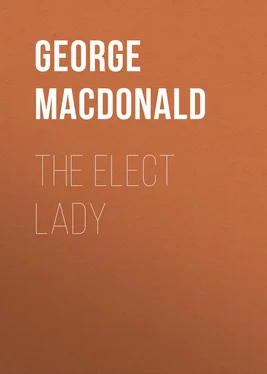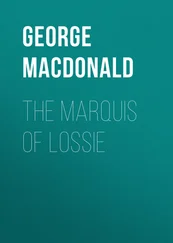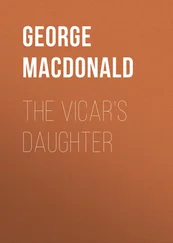George MacDonald - The Elect Lady
Здесь есть возможность читать онлайн «George MacDonald - The Elect Lady» — ознакомительный отрывок электронной книги совершенно бесплатно, а после прочтения отрывка купить полную версию. В некоторых случаях можно слушать аудио, скачать через торрент в формате fb2 и присутствует краткое содержание. Жанр: foreign_prose, foreign_religion, literature_19, foreign_antique, на английском языке. Описание произведения, (предисловие) а так же отзывы посетителей доступны на портале библиотеки ЛибКат.
- Название:The Elect Lady
- Автор:
- Жанр:
- Год:неизвестен
- ISBN:нет данных
- Рейтинг книги:5 / 5. Голосов: 1
-
Избранное:Добавить в избранное
- Отзывы:
-
Ваша оценка:
- 100
- 1
- 2
- 3
- 4
- 5
The Elect Lady: краткое содержание, описание и аннотация
Предлагаем к чтению аннотацию, описание, краткое содержание или предисловие (зависит от того, что написал сам автор книги «The Elect Lady»). Если вы не нашли необходимую информацию о книге — напишите в комментариях, мы постараемся отыскать её.
The Elect Lady — читать онлайн ознакомительный отрывок
Ниже представлен текст книги, разбитый по страницам. Система сохранения места последней прочитанной страницы, позволяет с удобством читать онлайн бесплатно книгу «The Elect Lady», без необходимости каждый раз заново искать на чём Вы остановились. Поставьте закладку, и сможете в любой момент перейти на страницу, на которой закончили чтение.
Интервал:
Закладка:
The next thing, as a matter of course, was to look about for a third.
“Dawtie!” cried both at once.
Dawtie was the child of a cotter pair, who had an acre or two of their father’s farm, and helped him with it. Her real name has not reached me; Dawtie means darling , and is a common term of endearment—derived, Jamieson suggests, from the Gaelic dalt , signifying a foster-child . Dawtie was a dark-haired, laughing little darling, with shy, merry manners, and the whitest teeth, full of fun, but solemn in an instant. Her small feet were bare and black—except on Saturday nights and Sunday mornings—but full of expression, and perhaps really cleaner, from their familiarity with the sweet all-cleansing air, than such as hide the day-long in socks and shoes.
Dawtie’s specialty was love of the creatures. She had an undoubting conviction that every one of them with which she came in contact understood and loved her. She was the champion of the oppressed, without knowing it. Every individual necessity stood on its own merits, and came to her fresh and sole, as if she had forgotten all that went before it. Like some boys she had her pockets as well as her hands at the service of live things; but unlike any boy, she had in her love no admixture of natural history; it was not interest in animals with her, but an individual love to the individual animal, whatever it might be, that presented itself to the love-power in her.
It may seem strange that there should be three such children together. But their fathers and mothers had for generations been poor—which was a great advantage, as may be seen in the world by him who has eyes to see, and heard in the parable of the rich man by him who has ears to hear. Also they were God-fearing, which was a far greater advantage, and made them honorable; for they would have scorned things that most Christians will do. Dawtie’s father had a rarely keen instinct for what is mean, and that not in the way of abhorrence in others, but of avoidance in himself. To shades and nuances of selfishness, which men of high repute and comfortable conscience would neither be surprised to find in their neighbors nor annoyed to find in themselves, he would give no quarter. Along with Andrew’s father, he had, in childhood and youth, been under the influence of a simple-hearted pastor, whom the wise and prudent laughed at as one who could not take care of himself, incapable of seeing that, like his master, he laid down his life that he might take it again. He left God to look after him, that he might be free to look after God.
Little Dawtie had learned her catechism, but, thank God, had never thought about it or attempted to understand it—good negative preparation for becoming, in a few years more, able to understand the New Testament with the heart of a babe.
The brothers had not long to search before they came upon her, where she sat on the ground at the door of the turf-built cottage, feeding a chicken with oatmeal paste.
“What are you doin’, Dawtie?” they asked.
“I’m tryin’,” she answered, without looking up, “to haud the life i’ the chuckie.”
“What’s the matter wi’ ‘t?”
“Naething but the want o’ a mither.”
“Is the mither o’ ‘t deid?”
“Na, she’s alive eneuch, but she has ower mony bairns to hap them a’; her wings winna cower them, and she drives this ane awa’, and winna lat it come near her.”
“Sic a cruel mither!”
“Na, she’s no’ cruel. She only wants to gar’t come to me! She kenned I would tak it. Na, na; Flappy’s a guid mither! I ken her weel; she’s ane o’ our ain! She kens me, or she would hae keepit the puir thing, and done her best wi’ her.”
“I ken somebody,” said Andrew, “that would fain spread oot wings, like a great big hen, ower a’ the bairns, you an’ me an’ a’, Dawtie!”
“That’s my mither!” cried Dawtie, looking up, and showing her white teeth.
“Na, it’s a man,” said Sandy.
“It’s my father, than!”
“Na, it’s no. Would ye like to see Him?”
“Na, I’m no carin’.”
“Sandy and me’s gaein’ to see Him some day.”
“I’ll gang wi’ ye. But I maun tak’ my chuckie!”
She looked down where she had set the little bird on the ground; it had hobbled away and she could not see it!
“Eh,” she cried, starting up, “ye made me forget my chuckie wi’ yer questions! It’s mither ‘ill peck it!”
She darted off, and forsook the tale of the Son of Man to look after her chicken. But presently she returned with it in her hands.
“Tell awa’,” she said, resuming her seat “What do they ca’ Him?”
“They ca’ Him the Father o’ Jesus Christ.”
“I’ll gang wi’ ye,” she answered.
So the church was increased by a whole half, and the fraction of a chicken—type of the groaning creation, waiting for the sonship.
The three gathered to read and pray. And almost always there was some creature with them in the arms or hands of Dawtie. And if the Lord was not there, too, then are we Christians most miserable, for we see a glory beyond all that man could dream, and it is but a dream! Whose dream?
They went on at other times with the usual employments and games of children. But there was this difference between them and most grown Christians, that when anything roused thought or question they at once referred it to the word of Jesus, and having discovered His will, made haste to do it. It naturally followed that, seeing He gives the spirit to them that obey Him, they grew rapidly in the modes of their Master, learning to look at things as He looked at them, to think of them as He thought of them, to value what He valued, and despise what He despised—all in simplest order of divine development, in uttermost accord with highest reason, the whole turning on the primary and continuous effort to obey.
It was long before they came to have any regular time of meeting. Andrew always took the initiative in assembling the church. When he called they came together. Then he would read from the story, and communicate any discovery he had made concerning what Jesus would have them do. Next, they would consult and settle what they should ask for, and one of them, generally Andrew, but sometimes Sandy, would pray. They made no formal utterance, but simply asked for what they needed. Here are some specimens of their petitions:
“Oh, Lord, Sandy canna for the life o’ ‘im un’erstan’ the rule o’ three; please, Lord, help him.”
“Oh, Lord, I dinna ken onything I want the day; please gi’e us what we need, an’ what ye want us to hae, wi’oot our askin’ it.”
“Lord, help us; we’re ill-natnr’d ( bad-tempered ) the day; an’ ye wadna hae us that.”
“Lord, Dawtie’s mither has a sair heid ( headache ); mak her better, gien ye please.”
When their prayers were ended Andrew would say: “Sandy, have you found anything He says?” and there-upon, if he had, Sandy would speak. Dawtie never said a word, but sat and listened with her big eyes, generally stroking some creature in her lap.
Surely the part of every superior is to help the life in the lower!
Once the question arose, in their assembly of three and a bird, whose leg Dawtie had put in splints, what became of the creatures when they died. They concluded that the sparrow that God cared for must be worth caring for; and they could not believe He had made it to last only such a little while as its life in this world. Thereupon they agreed to ask the Lord that, when they died, they might have again a certain dog, an ugly little white mongrel, of which they had been very fond. All their days thereafter they were, I believe, more or less consciously, looking forward to the fulfillment of this petition. For their hope strengthened with the growth of their ideal; and when they had to give up any belief it was to take a better in its place.
Читать дальшеИнтервал:
Закладка:
Похожие книги на «The Elect Lady»
Представляем Вашему вниманию похожие книги на «The Elect Lady» списком для выбора. Мы отобрали схожую по названию и смыслу литературу в надежде предоставить читателям больше вариантов отыскать новые, интересные, ещё непрочитанные произведения.
Обсуждение, отзывы о книге «The Elect Lady» и просто собственные мнения читателей. Оставьте ваши комментарии, напишите, что Вы думаете о произведении, его смысле или главных героях. Укажите что конкретно понравилось, а что нет, и почему Вы так считаете.












